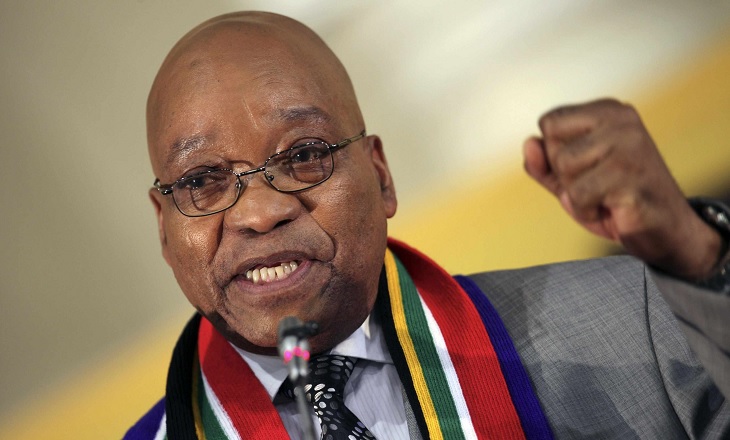World leaders are regularly subjected to criticism from all quarters, it comes with the job – just ask Donald Trump, Theresa May, and Emmanuel Macron (to name a few). The rise of platforms like Twitter have made it easy for the general public to voice their discontent and they can record and pick apart every speech, utterance and action of their leaders. This freedom of speech and the publishing of the millions of opinions in real time, has the ability to move markets and topple errant leaders, says FXTM’s Communications Manager, Emma Davidson.

Emma Davidson, FXTM
When discontent amongst the electorate progresses to a vote of no confidence in a leader, it usually results in them stepping down. South Africa, however, is one of the exceptions and, although it is regarded as a democracy, Jacob Zuma has just faced down his eighth vote of no confidence. Is this indicative of a fundamental flaw in the political machine that’s keeping him in power?
Allegations of foul play have swirled around President Zuma for years, and have impacted investor confidence. The ZAR strengthened 1.7% against USD early in August, when the vote of no confidence was tabled. Expectations that the vote would go through were high, especially since the ballot would be secret (in previous sessions the members votes could be seen by the president). It was thought that, with their identity protected, ANC members in the anti-Zuma camp would finally have the protection they needed to oust their wayward leader. In reality, it wasn’t enough, and Zuma survived a vote of no confidence that saw the ZAR slide, losing its gains from the previous two weeks.
South Africa has already been downgraded by the big three ratings agencies this year, which this does nothing for investor confidence. While South Africa purportedly lacks the three major factors that attracts international investors – economic growth, sound fiscal policy, and stable politics – the world’s favourite emerging market (EM) still has an ace or two up its sleeve. By 15 August, the ZAR had recovered 1.4% on the previous week, making it one of the best performing EM currencies for that seven-day period.
The ZAR’s endurance is a testament to the strength of an economy built on commodities. The last time there was a sustained weakness in the rand (2011 until late 2015), it was the result of a downturn in commodity prices and turmoil in the workforce that had a negative impact on productivity. The rand remains robust while commodities are buoyant, and even extreme political unrest has failed to supress it in the short-term.
We have seen investors ‘buying the news’ of late, and the ZAR is no exception. Headlines focusing on corrupt leadership will always add an element of caution to the markets. Investors were clearly heartened by the possibility of a new leader at the reins of an influential EM economy, but it did not come to pass. South Africa’s commodity-focussed market is likely to weather an ineffective government in the short -term, but the economy will suffer if the major institutions like electricity, transport, airlines and water are blighted by ineffective management and oversight. If the ruling party gets voted out, 2019 may well be a definitive moment in South Africa’s history. Perhaps then we will see what the rand is really capable of — some experts say it should be sitting around ZARUSD 11.35.
Disclaimer: The content in this article comprises personal opinions and ideas and should not be construed as containing personal and/or other investment advice and/or an offer of and/or solicitation for any transactions in financial instruments and/or a guarantee and/or prediction of future performance. FXTM, its affiliates, agents, directors, officers or employees do not guarantee the accuracy, validity, timeliness or completeness of any information or data made available and assume no liability as to any loss arising from any investment based on the same.
Risk Warning: There is a high level of risk involved with trading leveraged products such as forex and CFDs. You should not risk more than you can afford to lose, it is possible that you may lose more than your initial investment. You should not trade unless you fully understand the true extent of your exposure to the risk of loss. When trading, you must always take into consideration your level of experience. If the risks involved seem unclear to you, please seek independent financial advice.
NOTES TO EDITORS
The FXTM brand provides international brokerage services and gives access to the global currency markets, offering trading in forex, precious metals, Share CFDs, ETF CFDs and CFDs on Commodity Futures. Trading is available via the MT4 and MT5 platforms with spreads starting from just 1.3 on Standard trading accounts and from 0.1 on ECN trading accounts. Bespoke trading support and services are provided based on each client’s needs and ambitions – from novices, to experienced traders and institutional investors. ForexTime Limited is regulated by the Cyprus Securities and Exchange Commission (CySEC), with license number 185/12, licensed by the SA FSB with FSP number 46614, and registered with the UK FCA under reference number 600475. FT Global Limited is regulated by the International Financial Services Commission (IFSC) with license numbers IFSC/60/345/TS and IFSC/60/345/APM.
